1st ESG Advisory Board (2021)
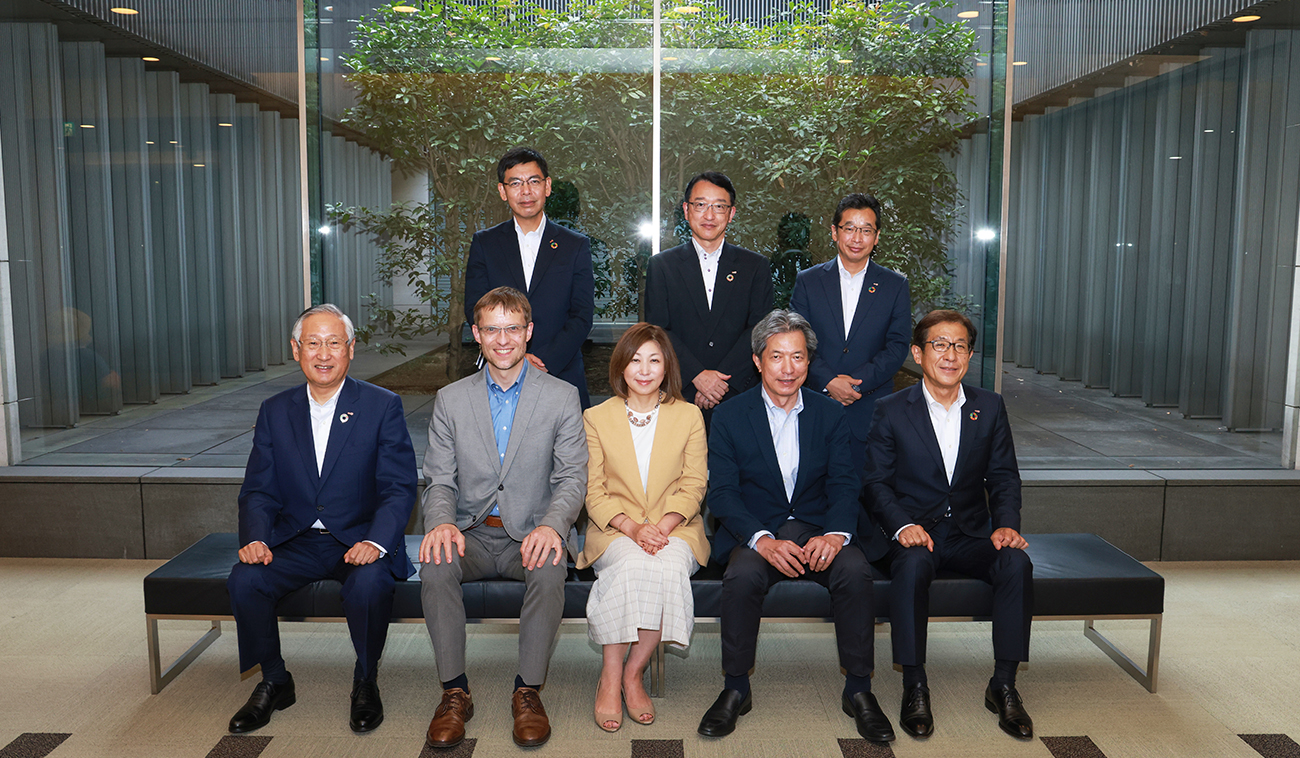
Date: August 25, 2021
Participants:
- [Experts]
- Takeshi Kamigochi
Senior Managing Executive Officer, Vice General Manager, Oil & Fats
Business Unit, J-OIL MILLS, INC. - Mari Kogiso
Co-CEO, SDG Impact Japan - Peter David Pedersen
Representative Director, NPO NELIS
- [Internal Members]
- Kazuo Kawamura
Chief Executive Officer, President and Representative Director - Jun Furuta
Chief Sustainability Officer, Member of the Board and Senior Managing Executive Officer - Shinji Matsuoka
Executive Officer, Sustainability Management Dept. - Yuhei Matsumoto
Executive Officer, Group HR Strategy Dept. - Katsushi Nagamori
General Manager, Corporate Development Dept.
- Themes:
- Topic 1 Meiji Group human rights initiatives
- Topic 2 Environmental initiatives
- Topic 3 General overview of Meiji Group sustainability activities
Topic 1 Meiji Group human rights initiatives
The basis of human rights to respect and care that acknowledges all people
Matsuoka
The Meiji Group has advanced and enhanced its human rights initiatives since 2018, when we drafted our Sustainability 2026 Vision. In 2019, we established the Meiji Group Human Rights Meeting and started conducting human rights due diligence. Some of the priority issues we first identified were human rights related to our raw material sourcing and foreign laborers. In 2020, we drafted a Supplier Code of Conduct and evaluated 74 primary suppliers using surveys created by EcoVadis as well as original surveys created internally at Meiji. In addition to promoting improvements at suppliers that were below criteria, moving forward we plan to expand these evaluations to include the suppliers of Japanese Group companies as well as overseas Group companies.
Pedersen
Does your foreign labor workforce include foreign technical intern trainees?
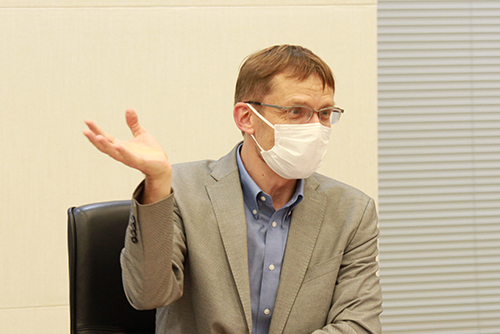
Matsuoka
There is one company within the Meiji Group in Japan that does hire technical intern trainees. As a result of interviews with the company, we confirmed there to be no particular issues. We also are aware of the fact that a number of manufacturing contractors also hire technical intern trainees, so we are conducting evaluations concerning the status of employment.
Pedersen
The global view of technical intern program in Japan is that it treats people like pieces in an economic game, and such programs are also in violation of Goal 8 of the SDGs. I believe you must go beyond implementing simple checks, and that you must disseminate to all your stakeholders that your approach to foreign workers is based on the tenets of respect and care.
Kogiso
I think it is excellent that you are directly conducting interviews concerning the status of hiring for foreign laborers. Moving forward, you may also want to consider establishing a hotline for foreign workers.

Kamigochi
I think a hotline is certainly a good idea. At Walmart, where I previously worked, they had created hotlines across the globe that provided 24-hour accessibility and ensured information reached the corporate heads in each country very quickly. Follow-up was also perfect. They had a corporate culture of respecting all people, and they responded to even the smallest things. This respect extended to employees as well as customers. Even now I remember their four pillars: respect for the individual, service to the customer, strive for excellence, and act with integrity. Establishing a culture is important. I hope for something that results in people naturally taking action. This is why choosing memorable keywords is necessary. Walmart chose the simple expression of “respect all people,” and this is something that stays in the minds of more than two million employees. That is what was amazing about Walmart. I think it is important to consider viability as a message.
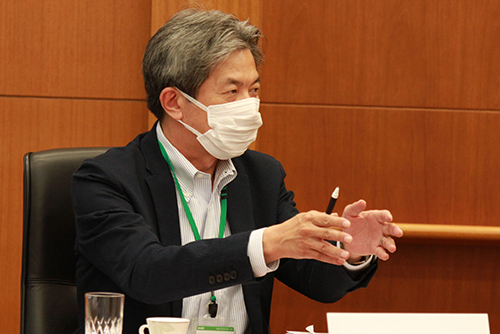
Topic 2 Environmental initiatives
The major issue for corporations: Discovering “trade-ons” through TCFD.
Matsuoka
As TCFD initiatives, we started conducting analysis in 2019, with this year marking the third time. We analyzed a total of four patterns, 4℃ and 2℃ scenarios for 2030 and 2050, for dairy raw materials, infectious disease products (antibacterial drugs, vaccines), and cocoa. We confirmed that the risks that could have a major impact were issues that are common to all business domains. There were four key points: losses due to flood damage, cost increases due to the adoption of carbon pricing, cost increases for purchasing electricity, and cost increases for raw material sourcing. In particular, we anticipate cost increases for major raw materials could have an impact on raw material sourcing. This includes factors such as reduced cocoa bean harvests due to climate change and increased costs for farmers to implement heat mitigation measures. While we can evaluate absorbing cost increases by increasing the added value of products, optimizing our portfolio, and implementing price revisions, it will also be critical that we strengthen support for farmers in order to address future threats to stable sourcing.
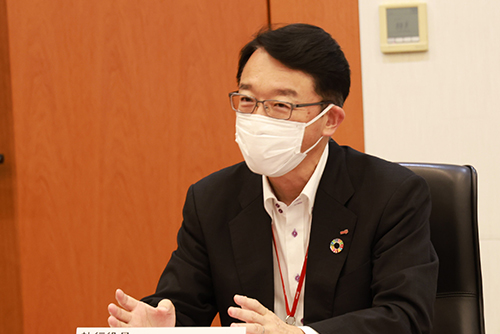
Furuta
Recently, there has been an increase in buy-side ESG analysts. They have a solid understanding of TCFD and we are seeing a significant increase in requests for quantitative data. As a result, we also decided to disclose the impact of adopting Scope 1 and Scope 2 carbon pricing.
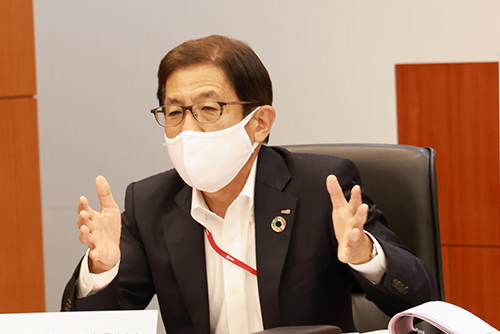
Kawamura
I think that, if TCFD shows that sourcing costs will increase for major raw materials, then it is necessary to change operating strategies. Only maintaining the status quo will eventually lead to losses. It is necessary to consider how to change the framework of our business.
Pedersen
Exactly. No matter how excellent your analysis is, simply controlling risks will not be enough to garner a positive evaluation from investors. Management needs to tell a story. I think the level of the company’s risk analysis is superb, but I also think there is a need to evaluate how to create new future opportunities. If only resulting in cost increases, sustainability initiatives will be seen as a burden. This is what investors are most concerned about.
Kawamura
In other words, this means establishing a fixed relationship between TCFD analysis and business strategy. This is something we are seriously evaluating, including for operating companies. At the same time, I do not think it is difficult to search for opportunity within TCFD analysis. Recent examples of directly turning efforts to resolve social issues into business opportunity include the vaccine-related business opportunities resulting from the COVID-19 pandemic. Pharmaceutical companies are posting significant sales. We too should be able to discover opportunities by shifting our way of thinking.
When you look at chocolate, for example, the main ingredient is the cocoa, but only the seed at the center of bean is used, with the majority of the remained being thrown away. However, that waste contains useful components such as fiber. I think it would be interesting if we can create new proposals for using the portions of materials that previously we did not use.
Pedersen
For sure, agricultural waste is garnering attention worldwide. I think there is potential to link such waste to new opportunities. Challenging yourselves to new domains while continuing to generate profits in existing domains. There are various possibilities.
Kawamura
With raw milk, there are issues of the methane produced by cows and the nitrous oxide emitted from cow manure. If those problems can be resolved, it will mean offering environmentally friendly raw milk. Such proposals would help increase the added value of milk and make positive contributions to people’s health.
Kamigochi
What can you offer and what is the purpose of being for the company? There’s no meaning if TCFD disclosures become the objective and the company loses its true purpose of being. There is a need to carefully look at methods and objectives.
Pedersen
Climate change is an issue that companies must work to resolve but it is up to management to find trade-ons. Settling for trade-offs cannot be considered business management. The strategy moving forward must include identifying how to use TCFD analysis to find trade-ons. This is the true responsibility of management.
Kawamura
I completely agree. TCFD must be seen as something that simultaneously includes a strategy for achieving trade-ons. We have opportunities to engage with people in agriculture, such as dairy farmers and cocoa farmers. Agriculture is traditionally an off-set industry so it is possible that being able to propose new businesses would lead to new value creation. Thinking from this perspective is also necessary.
Pedersen
Having these occasions over the past few years, I think that the Meiji Group has made amazing advancements. You have a solid foundation for action. Moving to the next stage will require groupwide initiatives. I believe your next stage is to discover business innovation through group collaborations.
Kogiso
Recently, I have had opportunities to discuss issues related to foodtech and agritech with the Meiji Group. This is a domain that has seen a rapid influx of capital recently. With growing attention on finding opportunities while working to resolve climate change, I think you will see many startups that are eager to work with the Meiji Group once you begin working these trends into your initiatives.
Topic 3 General overview of Meiji Group sustainability activities
Engaging in sustainability activities that incorporate the appeal of the Meiji Group
Kamigochi
It is not necessary to go it alone on every initiative. I think it is very important that you utilize the appeal of the Meiji Group as you incorporate various ideas. Our company presses soybeans, and currently we are increasing our focus on the byproducts of that pressing process. We created a new team that is working to shift our thinking. These efforts resonate with both employees and investors. In this way, I hope we can work together on resonance marketing.
Kogiso
The people working in sustainability departments sincerely struggle with whether to prioritize costs or profits. Even if they receive directives from above, it can be difficult to gain understanding from the people in the trenches. Developing trade-ons is important but, at the same time, sharing value recognition is very difficult so I think things will improve if companies can create opportunities for discussions about these issues as it relates to various processes, and also work to disseminate values.
Pedersen
Sustainability is the 5th pillar of competition. The first pillar is self-reform; the ability to reform your business model in a way that is aligned with the current times. Then, the other pillars are market share, price, and quality. Thus far, companies have competed based on these four pillars. Moving forward, we are entering an age in which competitiveness will be swayed by how companies handle this 5th pillar of competition, sustainability. Linking sustainability to competitiveness is an issue for everyone participating in this meeting today. The businesses that accomplish this will become the winners of the future.
Kawamura
Rather than an ESG Advisory Board, this feels more like a management meeting. Your comments are a great source of courage.
Furuta
Thank you for your time today. This was our first Advisory Board meeting but it was a source of many valuable opinions. On the issue of human rights, the idea of making it a part of the culture is something that I want to take away from this meeting. With TCFD as well, I agree with the assessment that we have not sufficiently discovered new opportunities. Next year, I want to make proposals for how we can capture such opportunities. I look forward to future meetings.






